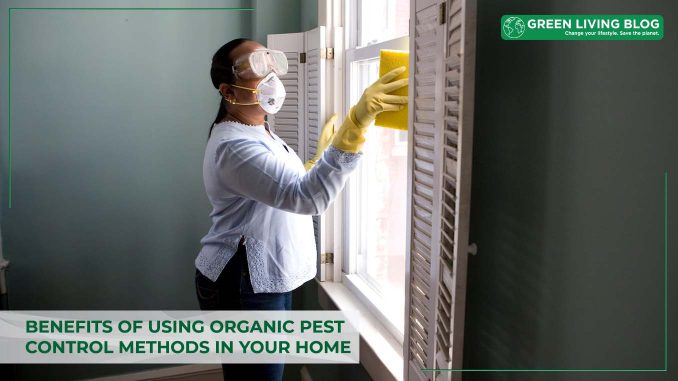
There is a universal truth known to every homeowner: where there is a home, there will be pests.
Ranging from microscopic bugs to larger, more troublesome critters, these uninvited guests can wreak havoc in your household. While traditional pest control methods are effective, the use of harsh chemicals can compromise the health of your family and the environment.
As such, a growing number of homeowners are turning towards organic pest control methods. They are effective, safe, and eco-friendly solutions to keep your home pest-free.
The primary focus of organic pest control is to make your home environment inhospitable for pests. It involves the use of naturally sourced substances and methods that are harmless to humans and pets but are lethal for pests. The merits of using organic pest control methods are numerous.
Let’s delve into these benefits and understand why it’s a wise decision to go green in managing home pests.
1. Healthier Home, Healthier Family

One of the most compelling reasons to opt for organic pest control is its safety aspect. Traditional pest control methods employ synthetic chemicals that can harm humans and pets. On the other hand, organic methods pose little to no health risks.
Children, who are more vulnerable to the harmful effects of chemical pesticides due to their developing immune systems, are significantly safer with organic alternatives. By choosing organic methods, you’re prioritizing the health of your family over temporary pest eradication.
2. Eco-Friendly Approach to Environment
Organic pest control methods are not just beneficial for your home but also for the larger environment. Chemical pesticides can seep into the soil, water, and air, causing extensive environmental damage. They can harm non-target organisms like birds, bees, and beneficial insects, disrupting the delicate balance of our ecosystems.
In stark contrast, organic pest control promotes biodiversity and helps in maintaining ecological balance. This sustainable approach safeguards the health of our planet for future generations.
3. Prolonged Effectiveness

One common myth about organic pest control is that it’s not as effective as synthetic methods. In reality, organic methods have prolonged effectiveness compared to their chemical counterparts. Pests can develop resistance to chemical pesticides over time, making them less effective.
Organic methods, however, rely on natural substances and processes that pests cannot easily resist. The use of biological controls like predatory insects, for instance, provides a long-term solution to pest problems.
4. Cost-Effective Solutions
In the long run, natural pest control methods can prove to be cost-effective. Traditional pesticides often require repeated applications as pests become resistant, adding to the expense. With organic methods, however, such concerns are alleviated.
Furthermore, a lot of organic pest control methods can be DIY, using ingredients available in your kitchen, such as vinegar, garlic, or cayenne pepper. These methods not only save money but also allow for immediate pest control actions.
5. Encourages Responsible Practices
Adopting organic pest control methods in your home can contribute to a more responsible lifestyle. It encourages the practice of composting, maintaining cleanliness, proper waste disposal, and regular maintenance of home surroundings – all crucial in pest prevention. These habits, while preventing pests, also enhance the overall cleanliness and hygiene of your home.
6. Embracing Nature’s Arsenal

When it comes to eco-friendly pest control, nature itself offers an impressive arsenal of methods. One such method is the use of beneficial insects, also known as biological control. This involves introducing natural predators, like ladybugs, praying mantis, or parasitic wasps, into your garden to keep pests in check. Another approach is companion planting, where certain plants are grown together to deter pests.
For example, marigolds can deter nematodes, while basil can repel mosquitoes and flies. Botanical insecticides derived from plants like neem or chrysanthemums are another effective, green option. Even household items, such as vinegar, salt, or diatomaceous earth, can be used as natural pest deterrents. By opting for these methods, you’re not just getting rid of pests; you’re doing so in a way that respects the interconnectedness of life. After all, true harmony lies in coexisting with nature, not in dominating it.
7. Championing Sustainable Choices
Embracing organic pest control is just the beginning. There’s a whole universe of sustainable choices awaiting exploration, each contributing to a healthier, greener planet. For instance, strive to reduce, reuse, and recycle as much as possible to cut down on waste. Choose energy-efficient appliances and use renewable energy sources, like solar power, to decrease your carbon footprint. Opt for locally sourced and organic food to support local farmers and reduce the environmental impact of transportation.
Even simple actions like turning off lights when not in use, taking shorter showers, or using reusable shopping bags can have a profound impact when practiced consistently. Remember, each small step toward an eco-friendly lifestyle is a giant leap toward a sustainable future. These choices don’t just preserve our planet for future generations, but they also set a powerful example for those generations about the importance of sustainable living. So, let’s start today, let’s make every choice count.
8. Partnering with The Busters Group

One reliable option for professional pest control is The Busters Group. They have a solid reputation for providing high-quality, efficient pest control services. Their team of trained and certified pest control technicians uses advanced pest control methods to manage any pest problem, whether it’s rodents, birds, insects, or other wildlife.
Plus, they offer bespoke pest control plans tailored to your property’s specific needs. They are known for their dedication to customer service, making sure you’re kept informed every step of the way. Partnering with a reputable firm like The Busters Group can give you peace of mind, knowing that your home is in good hands. Go to this website for more information on their expert services!
9. Embracing Green Pest Control Methods
As we strive to protect our homes from pests, it’s also crucial to consider the environmental impact of our actions. Thankfully, there are a growing number of green pest control methods that are not only effective but also environmentally friendly. Here at greenlivingblog.org.uk, you can find an array of articles and tips on eco-friendly living, including green pest control strategies.
These methods often involve using natural repellents, beneficial insects, or even making small adjustments to your lifestyle and property to make it less appealing to pests. Learning about and implementing these green pest control methods can help keep your home pest-free, without causing unnecessary harm to the environment.
Conclusion
Keeping your home pest-free is a matter of vigilance, prevention, and effective intervention when necessary. While you can handle minor pest issues yourself, remember that professional pest control services are invaluable for dealing with larger or more stubborn infestations. Following the guidance in this blog will help you maintain a comfortable, healthy, and pest-free home.
![]()
Author Profile
- Online Media & PR Strategist
- Blogger and Educator by Passion | Senior Online Media & PR Strategist at ClickDo Ltd. | Fascinated to Write Lifestyle Blogs in News & Education I have completed a journalism summer course at the London School of Journalism and manage various blogs.
Latest entries
 Green Expert GuidesMarch 28, 2025Lisbon Living: Where Sustainable Charm Meets Urban Energy
Green Expert GuidesMarch 28, 2025Lisbon Living: Where Sustainable Charm Meets Urban Energy EnvironmentJanuary 21, 2025Buying Eco-Friendly Homes: 6 Eco Questions to Ask Your Real Estate Agent
EnvironmentJanuary 21, 2025Buying Eco-Friendly Homes: 6 Eco Questions to Ask Your Real Estate Agent BusinessJanuary 16, 202510 Benefits of used Office Furniture when Refurbishing an Office
BusinessJanuary 16, 202510 Benefits of used Office Furniture when Refurbishing an Office Best practicesJanuary 6, 2025Eco-Friendly Event Planning: Mastering Sustainable Waste Management for Holiday Celebrations
Best practicesJanuary 6, 2025Eco-Friendly Event Planning: Mastering Sustainable Waste Management for Holiday Celebrations






Leave a Reply
You must be logged in to post a comment.